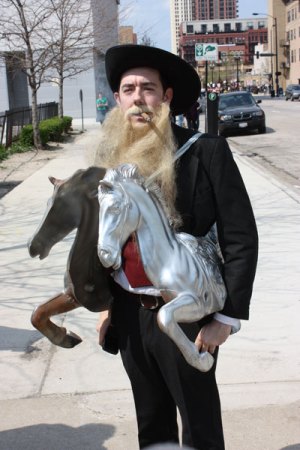Chicagoist's Top 11 for 2011: Government v. Labor
By Chuck Sudo in News on Dec 30, 2011 10:00PM

Kevin Robinson as Mayor Carter Harrison during the Haymarket Riot reenactments. (Josh Mogerman/Chicagoist)
It's neither ironic nor coincidental that, on the 125th anniversary of the Haymarket riots, organized labor has been besieged in a manner not seen in decades, and not only in Wisconsin. The only difference between Scott Walker's union busting in America's Dairyland and the actions of Gov. Pat Quinn and Mayor Rahm Emanuel in their dealings with labor is the way each was framed. Walker and Wisconsin Republicans took a cluster bomb to collective bargaining in the Badger state with such ferocity that Wisconsin Democrats tried to postpone a vote on Walker's collective bargaining bill by exiling themselves to Illinois. IN the aftermath of that battle, Walker has become Public Enemy Number One in the eyes of Wisconsin voters. My mother, who lives in rural South Wayne, WI, summed it perfectly: "No one I know in Wisconsin likes this governor."
Both Pat Quinn and Rahm Emanuel framed their stances against labor in terms of what was fiscally responsible for the State and City. Quinn backtracked on existing collective bargaining agreements with AFSCME by stating that the General Assembly sent him a budget proposal that was $2 billion less than he requested, and that the choice was out of his hands. AFSCME, which endorsed Quinn in last year's election, was understandably not pleased. Neither was an arbitrator, who quoted Bruce Springsteen as he ruled in favor of labor and restored the 2 percent pay raises promised by Quinn.
If Walker was brazen and Quinn appeared sheepish and passive in their dealings with Labor, Emanuel's stance was somewhere in-between. Chicago's new mayor further cemented his status as one whose actions bear watching, especially when contrasted with the vague nature of his words.
Emanuel made a habit of saying his tiffs with the Chicago Teachers Union and other labor unions were in "the best interest of Chicago's taxpayers." This bears mention; the voters who showed up at town hall meetings for the 2012 budget were skeptical of his plans for Chicago Public Schools, jobs creation and other particulars, and were there as much to hold Emanuel accountable as they were to vent.
It's also curious and symbolic that the first labor fight Emanuel picked was with the Chicago Teachers Union. With new CPS CEO Jean-Claude Brizard, an advocate of questionable "reforms" such as charterization during his tenure as head of the Rochester City Schools with a history of clashing with the teachers union there, CTU was already on guard. What was shocking was the way Emanuel was able to control the message in the media in his fight with CTU. Union president Karen Lewis seemed to be the only labor head to stand up to Emanuel. But the Teachers Union has failed time after time to counter the message from Emanuel, Brizard and others that CPS should have a longer school day.
The teachers are on the front lines here and know better than anyone the odds they face to educate the children in the school system. They should be able to better peroate those obstacles beyond their equally vague message of making better use of classroom time. Lewis is a dominating presence who certainly knows how to speak into a microphone, and yet the Teachers Union was consistently beaten to the punch by the Mayor's office on message.
With a collective bargaining agreement set to end next year, the stage is set for what could be a protracted battle between Emanuel and one of the City's strongest unions. Who winds up the victor could determine what happens with organized labor in Chicago in future years.